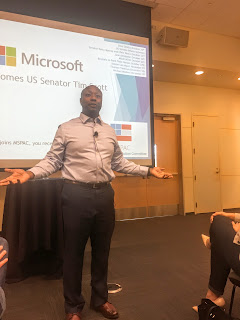Senator Tim Scott at Microsoft
 Tim Scott is the junior Senator for South Carolina. He was
appointed as senator in 2013 after South Carolina Governor Nikki Haley named
him to fill the Senate seat vacated by Jim DeMint. Scott ran in a special
election in 2014 for the final two years of DeMint's second term, and won the
seat. He now running for his first full Senate terms in 2016.
Tim Scott is the junior Senator for South Carolina. He was
appointed as senator in 2013 after South Carolina Governor Nikki Haley named
him to fill the Senate seat vacated by Jim DeMint. Scott ran in a special
election in 2014 for the final two years of DeMint's second term, and won the
seat. He now running for his first full Senate terms in 2016.
In November 2010, Scott was elected to the U.S. House of
Representatives for South Carolina's 1st congressional district, and served
from 2011 to 2013. Scott, a fiscal and cultural conservative, was endorsed for
the Senate by Tea Party groups (DeMInt’s Senate Conservative Fund). He
served one term in the South Carolina General Assembly (2009–2011); prior to
that, he had been on the Charleston County Council from 1996 to 2008.
Scott is one of two African Americans serving in the
Senate. He is the first African-American senator from the state of
South Carolina, the first black Republican elected to the Senate since the
defeat of Edward Brooke in 1979, and the first elected from the South since
1881, four years after the end of Reconstruction. Due to long decades of
disenfranchisement for African Americans in the South, he is the first
Republican African American Congressman from South Carolina since 1897 and
since the passage of the Voting Rights Act of 1965. He is also the
first African American to have been elected to both the House of
Representatives and the Senate.
Scott serves on the Small Business Committee, Energy &
Natural Resources Committee, the Commerce Science & Transportation
Committee and the Special Committee on Aging.
Opportunity Agenda: Senator Scott’s
“Opportunity Agenda” has been his primary focus since being elected to
Congress. The Agenda is founded on the principle that all Americans
should have the ‘opportunity’ to succeed. He fundamentally believes
people want to work, they want to get ahead and provide a better life for their
families. He has introduced four bills as part of the agenda: (1) The
SKILLS Act – focuses on delivering technology job training skills; (2) The
CHOICE Act – seeks to expand educational opportunities for individuals and
communities by making federal IDEA dollars portable; (3) the Southern Energy
Access Jobs Act or SEA Act focuses on expanding off-shore energy production;
and (4) the Leveraging and Energizing America’s Apprenticeship Program or LEAP
Act which provides tax credits to employers to help increase the number of
registered apprenticeships.


Comments
Post a Comment